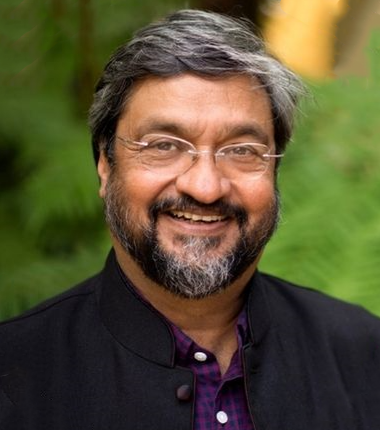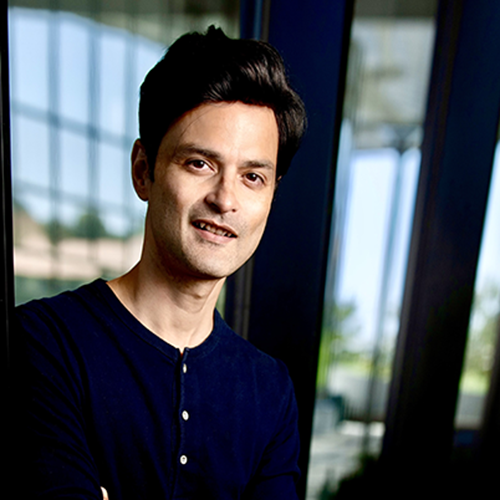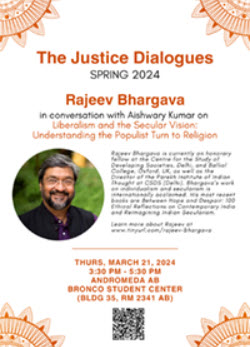The Justice Dialogues
Liberalism and the Secular Vision: Understanding the Populist Turn to Religion
Date: March 21, 2024Time: 3:30pm to 5:30pm
Location: Andromeda AB, Bronco Student Center (Building 35 Room 2341AB)
The Justice Dialogues
Spring 2024
Liberalism and Secular Vision
Understanding the Populist Turn to Religion
For better and for worse, the modern democratic experiment has always harbored within it a principled religious dimension: that something greater than our individual self-interest—a common, shared faith—must bind us together as citizens and equals on earth. Some of the greatest accomplishments of our civic and social contract rest on the faith that political majorities can be trusted to make decisions and laws that benefit even the most vulnerable, stigmatized, and outcast minorities who live next to them. Secularism can be viewed as one way of resolving this intractable—and historically violent— relationship between faith, inequality, and freedom.
As that humanist vision fumbles today, the most brazen attacks on human freedom and civil rights—the right to read, the right to vote, the right to choose, the right to seek asylum, the right of safe harbor from bombardment, the definitions of personhood—are carried out in the name of religious liberty by evangelicals and religious nationalists who openly profess their affinity for political violence and the fascist state. After a relatively quiet, resentful 20thcentury, evangelical hostility towards liberalism and its secular vision has returned to mass politics with a vengeance.
To ask the question, as Peter Wehner asks, “Where did Evangelicals go wrong?” is one way to proceed. With over one dozen leading countries of the world going into general elections this decisive year for global politics, we instead follow Judith Shklar’s lead and ask: can liberal democracy survive the new theocratic assault and its politics of fear? And how do we now understand political faith?

Rajeev Bhargava
Professor Rajeev Bhargava is honorary fellow at the Centre for the Study for Developing Societies (CSDS), Delhi, and Balliol College, University of Oxford, UK. Formerly professor of Political Science at the Center for Political Studies (CPS), Jawaharlal Nehru University, New Delhi, Professor Bhargava is currently the Director of the Parekh Institute of Indian Thought at CSDS Delhi. One of the most important voices in contemporary political thought, his work on individualism and secularism in internationally acclaimed. His recent books include Between Hope and Despair: 100 Ethical Reflections on Contemporary India (Bloomsbury, 2022) and Reimagining Secularism (Seagull, 2023).

Aishwary Kumar
Aishwary Kumar is a historian and political theorist who works on the relationship between human freedom and political violence. He specializes in South Asian, European, and American moral and political thought. Kumar holds the Shri Shantinath Endowed Chair in Ahimsa Studies and is the Director of the Ahimsa Center at CPP. He is the author of Radical Equality: Ambedkar, Gandhi, and the Risk of Democracy (Stanford, 2015) and The Neodemocratic Condition: Freedom and Violence after Neoliberalism (forthcoming). Follow his work at Mutant: Dialogues at the End of Democracy (Institute for New Global Politics | Spotify | Apple Podcasts, 2023-24).
